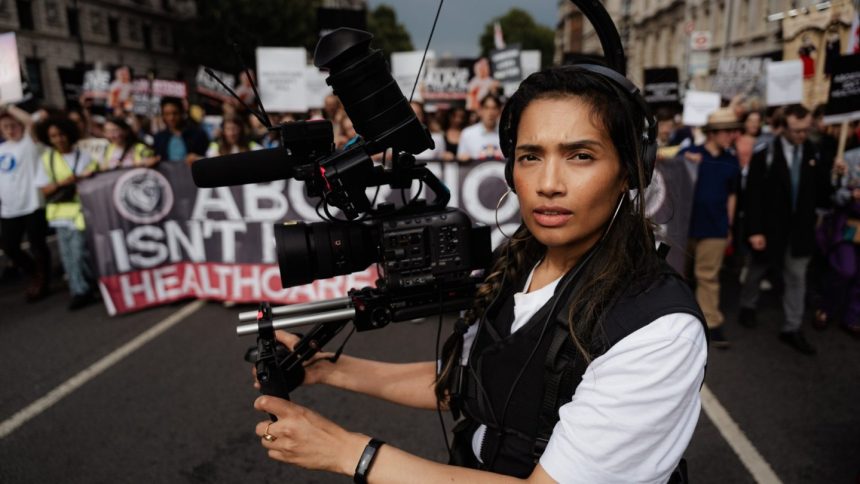How a New Generation of British Documentarians Is Embracing Politically Charged Storytelling
It’s no secret that the film and TV industry is getting more risk-averse. The projects awarded generous budgets are often anchored by existing IP (see: Disney’s constant stream of live-action remakes, endless Jurassic Park sequels or HBO’s Harry Potter reboot).
Now the industry’s play-it-safe ethos is spilling over into documentaries, with an unrelenting true-crime obsession among viewers and creative teams alike resulting in a steady churn of murder docs. Celebrity-led biographical projects, too, have swept in and emerged more popular than ever: Netflix’s Beckham accrued 3.8 million views in the U.K. alone in its launch week, and Paramount+’s new Eminem feature Stans just landed a limited U.S. theater run in August.
This cautiousness is even more pronounced in the political documentary space, especially in the U.S. where they aren’t being made at all. Financiers won’t back them; whether that’s down to Trump-driven fear or consumer-led strategy, edgy content isn’t finding a way through.
The same goes for the U.K.: a risk-averse climate has shifted the kinds of topics being tackled in the doc genre over the last 10 years. “I think broadcasters and commissioners, they want to know what the story is,” says producer Ahmed Peerbux. “They want to know how it ends. They want to know the beats. They want everything up front so they know that they’re banking on something sound.”
You Might Also Like
This is where an initiative from the British Academy of Film and Television Arts is hoping to help. Peerbux is part of 20 documentary and specialist factual filmmakers participating in the five-year-old BAFTA Elevate scheme, which platforms creatives with underrepresented backgrounds across the academy’s industry-spanning network to reach the next stage of their career.
This new generation of filmmakers are aiming to respond to a polarizing political climate and increasingly digital world, blending personal storytelling with political urgency in an age where authoritarianism looms large and trust in the world’s media has never been more critical.
Poppy Jay, whose recent work includes making and starring in the BBC‘s Young, British and Anti-Abortion and Young, Black and Right-Wing, wants to garner support in making edgier films that are tackling politically-charged content head-on.
“It’s a unique and privileged position to be in, to go into so many different worlds and have people trust you,” Jay tells THR. “But it’s frustrating as well, because the gatekeepers who commission these stories, their world view is one way and I see the world in another way because of my skin color and as a woman and my experience.”
Shaminder Nahal, head of specialist factual at Channel 4, is one of the key commissioners hoping to shift the industry from within by looking to the talent on BAFTA Elevate. “Today’s world is unbelievably complex, uncertain and polarized, and it’s all of our jobs to engage with that,” says Nahal.
Among Nahal’s recent comissions for Channel 4 are Defiance: Fighting the Far Right, looking at an Asian community in Britain who stood up to a racist campaign of violence and murder between 1976 and 1981, and Britain Under the Nazis: The Forgotten Occupation, about the Nazi occupation of the Channel Islands during World War II.
“We actively want to take risks, be disruptive and challenging,” Nahal says of the commissions she makes in the current climate. “We want to make a splash, and tell stories that say something about Britain — and this has never felt more urgent than now, against a backdrop of a rapidly changing country and a ferociously turbulent world… [We’re] grappling with changing politics, new technology and so many questions about who we are and what the future is going to be like.”
Nahal adds that audiences are increasingly more interested in the history space, mostly thanks to podcasts. Some of Channel 4’s most recent commissions are hoping to reflect this political push-and-pull between past and present. “Seventy-two Films are making a series on Tony Blair, one of our most significant prime ministers,” Nahal says. “And Swan Films are telling the story of the extraordinary Mitford sisters and through their lives we’ll see some of the major events of the 20th century playing out. [They are] the Kardashians of their age, also deeply controversial, some of them being close to Hitler and steeped in the rise of British fascism — all of which offers a fascinating perspective on today.”
But contrary to what some might think, insiders say many viewers aren’t always looking for an escape from current times, and do in fact want to be confronted with what’s happening in the world, as long as it’s being approached in a fresh way.
Rajesh Thind, producer and director of Channel 4’s Defiance: Fighting the Far Right doc, tells THR that viewers are desperate for new stories. “It makes really good business and commercial and creative sense to be seeking out stories that haven’t been told,” he says. “In a time like this, documentaries have a real role to play. We’re all living through this,” he says of the tumultuous political landscape, rise of AI and billionaire-backed government departments (see: Elon Musk’s Doge branch, which he has now stepped back from). Thind added: “And we all need to try and make sense of it.”
Peerbux, producer of 2025’s Grenfell: Uncovered, says that working on the Netflix U.K.-commissioned film was about making people angry. The feature is a bleak exploration of the decisions made that led to a London tower block being engulfed by a fire in the summer of 2017.
Director Olaide Sadiq drags into the spotlight the incompetence and greed of officials and companies, among them the local council, who erected decorative, cheap and highly flammable cladding around the tower. When it caught fire 72 people perished — a majority of them minorities who lived in the culturally diverse London neighborhood — in an entirely avoidable tragedy. The U.K. parliament later commissioned an independent review of building regulations and fire safety as the government investigates tower blocks with similar cladding. Efforts to replace the cladding on these buildings, a side effect of the Grenfell-triggered U.K. cladding crisis, are ongoing.
“Millions of people won’t read an inquiry report,” Peerbux says about making Grenfell’s story accessible. “It’s technical, it’s complicated. But lots of people subscribe to Netflix and it’s reaching people in a way that you might not otherwise be able to.”
The British are no strangers to bringing about political and societal change with the help of sincere television. ITV’s narrative feature Mr. Bates vs. the Post Office depicted how hundreds of sub-postmasters were wrongly convicted of theft — the true cause was a faulty IT system — between 1999 and 2015. The series, with Toby Jones in the titular role, prompted such outrage among viewers that the government exonerated victims and compensated them in thousands of pounds. Former Post Office boss Paula Vennells was publicly vilified and stripped of her CBE, a prestigious honor awarded by the King.
Sadiq and Peerbux’s Grenfell project went on to win the audience award at the 2025 Sheffield DocFest. It’s something, Peerbux says, that necessitated patience. Many documentaries these days are “quick turnaround,” produced in a matter of days in order to capitalize on a story while its fresh in the news cycle, and in people’s minds, too. “Some untruths, mistakes, can can slip in there if people are really squeezed and you’ve got a few weeks to look at this enormous issue.”
He sings Netflix’s praises: “We had months to really do this properly and to digest the research, to speak with people on the ground and comb through the primary documents in minute detail… And actually, for Netflix to have commissioned something like Grenfell: Uncovered, it’s not what you’d necessarily expect from that platform.”
“There’s clearly an appetite for it,” he says of political storytelling. “You can’t say that, ‘Oh no, people will be switched off by it.’ [Grenfell: Uncovered] has been number one [on Netflix in the U.K.] for days.”
Peerbux hopes it signals to other commissioners to take risks, and rely on filmmakers that pore over the fine details. “I’ve been completely glued to my screen and I’m horrified,” he adds about getting his news from social media. “No one’s really sure of anything anymore. There’s reassurance in the fact that something has been well-resourced. People want to go somewhere trustworthy.”
Thind, Jay and Peerbux have found solace in BAFTA Elevate. “We’re becoming a little production unit,” Thind says. “One of my fellow cohort colleagues came and helped me on a shoot recently for a new feature doc about a musician that I’m starting on my own back.”
Adds Jay: “We have information at our fingertips in a way that the generations above probably didn’t. And we want solutions. We want to disrupt what we’re seeing.”
While making Young, British and Anti-Abortion, she ran into an issue that’s becoming an increasingly difficult hurdle to clear for documentarians in the age of social media. “I remember a [potential interviewee] who was so, so good. And I had to say no politely, because she would have been absolutely trolled and ripped to pieces online [if featured in the film], and her mental health would have suffered.”
It’s a different world for documentarians who are dealing with new problems all the time. Jay says she wants to keep pushing the boundaries. “You have to really delicately tread a balance between what you want to make, and pick your battles,” she says. “The BBC are under so much scrutiny now. They’re brilliant in many ways, but it can be a challenge, because they are scrutinized by The Daily Mail, they’re scrutinized by the public, and they can’t win.
“Which is why I’m like, ‘Just fuck everyone and make the thing that you want to make.’ Because you’re damned if you do and you’re damned if you don’t.”







